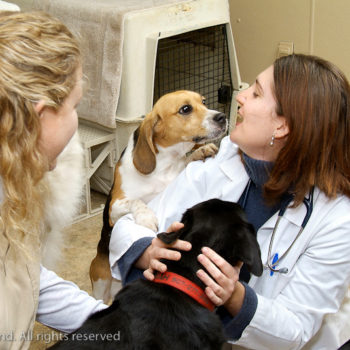Does your shelter face challenges with feline illness or behavioral health? Do you have a veterinarian on staff or do you work with an outside consultant? There’s a new grant that might help not only your organization but shelters everywhere!
The Winn Feline Foundation and PetSmart Charities have teamed up to offer grant opportunities in the area of shelter medicine. They will be accepting proposals to address the needs of shelter and community cats through December 11, 2017.
Because so many cats enter animal shelters already struggling with health and behavior issues, or develop them due to the stress of being in the shelter, the focus on shelter medicine is an obvious one for both organizations. Considered the leading funder of feline health research in the world, in the last 46 years, Winn has sponsored some of the most pivotal research into cat health and behavior, including the discovery of taurine deficiency as a cause of feline heart disease and blindness. “We hope we can help aid our feline friends and all that you are doing to make them healthier,” said Winn Executive Director Dr. Vicki Thayer. “Winn is excited to collaborate with PetSmart Charities in this significant opportunity.”
Last year, PetSmart Charities, the leading funder of animal welfare in North America, expanded its mission to find lifelong, loving homes for all pets by supporting programs and thought leadership that bring people and pets together. Since 1994, the organization has donated more than $310 million directly to pets and people in need, funding efforts such as pet adoption, spay and neuter programs and emergency relief efforts. “Providing quality shelter veterinary care is essential to preventing pet homelessness and helping shelter pets thrive while on their journey to finding a forever home,” said Roger Haston, Chief Administrative Officer, PetSmart Charities. “Together with Winn Feline Foundation, we look forward to supporting local animal welfare organizations’ efforts benefiting cats in need in their local communities.”
While the grants are not designed to cover adoption programs, the two organizations believe improving feline health and behavior will result in increased adoption of shelter cats. They’re also not just looking to fund research that helps cats in one shelter, but that will have an impact on shelter medicine overall and lead to the development of best practices for all shelters.
Health and behavior conditions that may be considered include, but aren’t limited to: feline upper respiratory infection; ringworm; panleukopenia; diarrhea in neonates and foster kittens; general neonatal health; parasites; the impact of housing and its associated stressors; the effect of intensive handling on the development of stress-related behavior and health problems; failure to engage in normal behaviors such as elimination, grooming and eating; euthanasia due to fearful behaviors.
At least three grants will be awarded, each with a maximum amount of $25,000 and intended to cover proposals that can be completed within a single year. Applicants may be faculty veterinarians, post-doctoral fellows (PhDs, either DVM or non-DVM), practicing veterinarians or veterinary students with an interest in feline shelter medicine or population management.
Additional information, and links to grant applications, can be found here.

